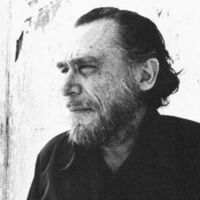Ham on Rye: 2
I remember the Model-T. Sitting high, the running boards seemed
friendly, and on cold days, in the mornings, and often at other times, my
father had to fit the hand-crank into the front of the engine and crank it
many times in order to start the car.
“A man can get a broken arm doing this. It kicks back like a horse.”
We went for Sunday rides in the Model-T when grandmother didn’t visit.
My parents liked the orange groves, miles and miles of orange trees always either in blossom or full of oranges. My parents had a picnic basket and a metal chest. In the metal chest were frozen cans of fruit on dry ice, and in
the picnic basket were weenie and liverwurst and salami sandwiches, potato chips, bananas and soda-pop. The soda-pop was shifted continually back and forth between the metal box and the picnic basket. It froze quickly, and
then had to be thawed.
My father smoked Camel cigarettes and he knew many tricks and games which he showed us with the packages of Camel cigarettes. How many pyramids were there? Count them. We would count them and then he would show us more of them.
There were also tricks about the humps on the camels and about the
written words on the package. Camel cigarettes were magic cigarettes. There was a particular Sunday I can recall. The picnic basket was empty. Yet we still drove along through the orange groves, further and further away from where we lived.
“Daddy,” my mother asked, “aren’t we going to run out of gas?” “No, there’s plenty of god-damned gas.”
“Where are we going?”
“I’m going to get me some god-damned oranges!”
My mother sat very still as we drove along. My father pulled up
alongside the road, parked near a wire fence and we sat there, listening.
Then my father kicked the door open and got out.
“Bring the basket.”
We all climbed through the strands of the fence.
“Follow me,” said my father.
Then we were between two rows of orange trees, shaded from the sun by
the branches and the leaves. My father stopped and reaching up began yanking oranges from the lower branches of the nearest tree. He seemed angry, yanking the oranges from the tree, and the branches seemed angry, leaping up and down. He threw the oranges into the picnic basket which my mother held. Sometimes he missed and I chased the oranges and put them into the basket. My father went from tree to tree, yanking at the lower branches,
throwing the oranges into the picnic basket.
“Daddy, we have enough,” said my mother.
“Like hell.”
He kept yanking.
Then a man stepped forward, a very tall man. He held a shotgun.
“All right, buddy, what do you think you’re doing?”
“I’m picking oranges. There are plenty of oranges.”
“These are my oranges. Now, listen to me, tell your woman to dump
them.”
“There are plenty of god-damned oranges. You’re not going to miss a few god-damned oranges.”
“I’m not going to miss any oranges. Tell your woman to dump
them.”
The man pointed his shotgun at my father.
“Dump them,” my father told my mother. The oranges rolled to the ground.
“Now,” said the man, “get out of my orchard.”
“You don’t need all these oranges.”
“I know what I need. Now get out of here.”
“Guys like you ought to be hung!”
“I’m the law here. Now move!”
The man raised his shotgun again. My father turned and began walking
out of the orange grove. We followed him and the man trailed us. Then we got
into the car but it was one of those times when it wouldn’t start. My father
got out of the car to crank it. He cranked it twice and it wouldn’t start.
My father was beginning to sweat. The man stood at the edge of the road.
“Get that god-damned cracker box started!” he said. My father got ready
to twist the crank again. “We’re not on your property! We can stay here as
long as we damn well please!”
“Like hell! Get that thing out of here, and fast!”
My father cranked the engine again. It sputtered, then stopped. My
mother sat with the empty picnic box on her lap. I was afraid to look at the
man. My father whirled the crank again and the engine started. He leaped
into the car and began working the levers on the steering wheel.
“Don’t come back,” said the man, “or next time it might not go so easy
for you.”
My father drove the Model-T off. The man was still standing near the
road. My father was driving very fast. Then he slowed the car and made a U–
turn. He drove back to where the man had stood. The man was gone. We speeded back on the way out of the orange groves.
“I’m coming back some day and get that bastard,” said my father.
“Daddy, we’ll have a nice dinner tonight. What would you like?” my
mother asked.
“Pork chops,” he answered.
I had never seen him drive the car that fast.







